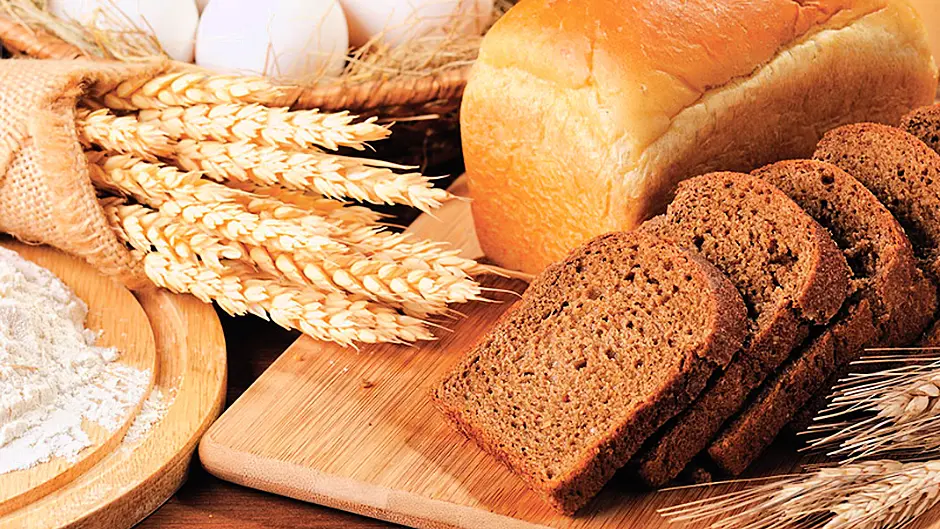It’s estimated that coeliac disease affects around one in a hundred throughout Ireland.
It’s estimated that coeliac disease affects around one in a hundred throughout Ireland. The HSE believes that 50-90% of cases are either undiagnosed, or misdiagnosed with other conditions like IBS. In fact, Ireland has the highest incidence in Europe.
Coeliac Disease (CD) is an extreme sensitivity to gluten, a protein found in wheat (and so in bread, bulgur, couscous, semolina, pasta etc), rye and barley. It often appears either around the time of weaning, or in our thirties, and tends to run in families (if there is a genetic predisposition, take extra care with infants – breast feed if at all possible, and don’t wean before six months). The condition also occurs more commonly in those with other autoimmune disorders such as type 1 diabetes, thyroid disease and rheumatoid arthritis and, just to complicate matters further, often coexists with lactose intolerance.
For someone with CD, gluten causes inflammation in the gut (and so beyond) that damages the villi – tiny hair-like protrusions on the lining of the small intestine designed to absorb the nutrients from our food. Besides nutritional deficiencies, obvious signs are failure to thrive (in babies), diarrhoea (sometimes constipation), weight loss, anaemia (breathlessness, extreme fatigue, pale skin), bloating and abdominal pain or distension, pale/offensive/fatty/floating stools and skin problems. Other symptoms include nausea, joint pain, thinning hair, depression and irritability, mouth ulcers, infertility, weak tooth enamel, brittle bones, Chronic Fatigue Syndrome, upper respiratory tract problems like sinusitis or middle ear issues, general loss of wellbeing, and ADHD. If you have any group of these symptoms, you need to see your GP for tests. It’s important not to stop eating gluten before the test.
The problem for coeliacs is that gluten features in an astonishing array of products, not just the obvious breads, pastries, pizzas, cakes and biscuits but also in many processed foods, including tinned/frozen items, sauces, sausages, burgers, takeaways, stocks, condiments, snacks, desserts, sweets, spreads, and some drinks, medications and supplements. On top of that, even GF grains and flours, if not specifically labelled gluten-free, can be cross-contaminated by wheat products during storage and packaging. Your GP should be able to give you a list, while the Coeliac Society of Ireland offers its members full lists of foods.
Many health professionals feel that the rise in availability of commercial GF products such as breads and cakes has led people to believe that all that matters is finding palatable replacements for gluten containing foods. These tend to be expensive, and often contain undesirables such as extra sugar or starches to bind them or add flavour. Processed food is processed food, and a healthy diet is just as important for coeliacs as it is for everyone. Bread, pasta, cakes and breakfast cereals contribute very little, nutritionally speaking, and a gluten-free diet can be fairly straightforward if you stick to whole unprocessed foods, and cook them from scratch.
There are many people who steer clear of grains altogether, for health as well as weight loss reasons, but wholegrains do contain valuable fibre and phytonutrients and there are several that coeliacs can eat. Rice, quinoa, amaranth, buckwheat (not a wheat), corn, teff, sorghum, and flours/pastas etc made purely from quinoa, buckwheat, potatoes, soybeans, chickpeas (gram flour), coconut, almonds, chestnuts, rice and corn are fine (so long as there’s no risk of cross-contamination), while oats and muesli can be eaten when they’re labelled GF. Many of the popular young chefs and cookery book writers include lots of recipes for tasty, gluten-free dishes, such as the teriyaki salmon in Shirin Kouros and Yasmine Larizadeh’s new The Good Life Eatery Cookbook, where you’ll also find gluten-free biscuits and desserts.
Otherwise, you can eat and drink normally – unprocessed fruit and veg, fish and seafood, meat, dairy (unless intolerant), pulses, nuts and seeds, oils, good quality chocolate, coffee and tea. Supplements must be labelled GF: those only recently diagnosed will be deficient in most nutrients, and would benefit from a high strength B complex as well as a good multivitamin and mineral. Digestive enzymes (especially papain, from papayas) can be useful, while glutamine feeds and heals the lining of the intestine. And of course, as this is an immune and inflammatory disorder originating in the gut, a good probiotic such as Bio Kult, and plenty of probiotic and prebiotic foods (live yoghurt and all fermented foods, asparagus, artichokes, garlic and onions, beans, greens, apples, bananas and GF oats) would be invaluable.
For more information, contact the Coeliac Society of Ireland on 01 8721471 or go to www.coeliac.ie.








